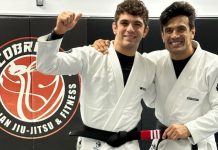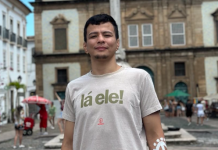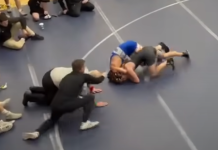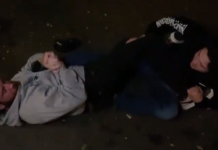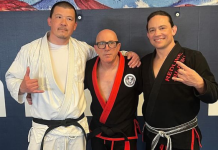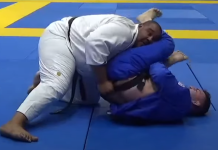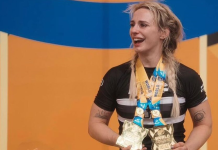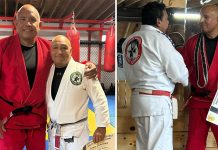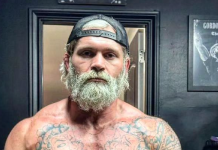Most of the biggest grappling stars currently emerging from Quebec, Canada – fan-favorite sensations like Ethan Crelinsten, Brianna Ste-Marie, and Oliver Taza – have been training long enough to remember an era before the ban on jiu-jitsu tournaments back home.
“I opened my gym in 2014, and it was marvelous – competition here was legal, so everything was okay,” says Steven Maclure, a proud Quebec native and local jiu-jitsu coach. “And then, for reasons that nobody understands, they canceled everything. They banned jiu-jitsu. Nobody really understood what happened. It was like a fog.”
While jiu-jitsu academies and gyms are technically still allowed to teach classes under Canadian law, competitions have been stamped out by a 2013 amendment passed by Canada’s House of Commons outlawing what they deemed to be unsanctioned “prize fighting.” The amendment, initially part of an effort to govern cage fighting, eventually trickled down to bans on local jiu-jitsu tournaments.
Founder of the advocacy organization One Two Jitsu, Maclure has been hard at work educating his home province’s government on the benefits of re-legalizing the gentle art. Inspired by his friend Betty Broadhurst and her jiu-jitsu organization RollForever – which promotes competition accessibility for grapplers – Maclure decided to launch an organization that could advocate on behalf of Quebec’s jiu-jitsu athletes.
“I wanted to create a brand that would promote jiu-jitsu in Quebec – and that was the birthplace of One Two Jitsu,” Maclure explains. His goal is for One Two Jitsu to work as a positive and proactive force in concert with Quebec’s government to bring jiu-jitsu competitions back to the province.
Since the founding of One Two Jitsu, Maclure has met several times with government officials in an effort to aid their understanding of what the gentle art is all about. “We have to educate the government to make sure that our competitions are safe for everyone to participate in,” says Maclure. “Once we do that, the government is really, really open to legalizing [jiu-jitsu] – but we have to do our work.”
One Two Jitsu has found some powerful allies among Québécois combat sports royalty. Those who have recently declared support for Maclure’s cause include Firas Zahabi of Montréal’s legendary Tristar Gym, an academy best known as the home of UFC Hall of Fame member Georges St. Pierre.
After all, few understand the plight of Quebec’s grapplers better than natives of the province who have, against all odds, reached the pinnacle of the sport on a global level – and these remarkable athletes remain some of the strongest voices calling to end the ban.
Oliver Taza: “There’s enough room for success for everybody.”
The first thing Oliver Taza brings up when I reach out to him for comment on the tournament ban is its deeply frustrating origins. “[Jiu-jitsu competitions] became illegal because of selfish reasons between two promoters who didn’t want to see each other succeed,” he tells the Jiu-Jitsu Times. “There’s enough room for success for everybody.”
Taza’s anecdote references a series of crackdowns on grappling shows in Quebec prompted by a pair of rival promoters who reportedly called the authorities on each other’s events in order to sabotage one another’s success. In the end, both promoters got what they wanted – but at the cost of the entire sport.
Taza wants to prove that jiu-jitsu still deserves a place in Quebec – and he’s been letting his actions speak for themselves. He’s part of the current wave of Québécois dominance on the jiu-jitsu scene, taking home no-gi gold in his division at IBJJF Euros this year, as well as a silver medal finish in the absolute.
But what does international acclaim mean for an athlete who still can’t legally compete in his own backyard? Fellow Quebecker, Tristar alumnus, and B-Team star Ethan Crelinsten has some thoughts.
Ethan Crelinsten: “If they did an IBJJF Open in Montreal, I’d fly back and do it in a heartbeat.”

“I started training and competing about nine or ten years ago – and looking back at it now, it was like the golden era of the competitive scene in Montreal,” Crelinsten remembers. “You could compete multiple times a month in your own backyard – in Grappling Industries, SAU, in super fight events that were being hosted.”
He adds, a little wryly, “I saw it all unfold – I saw the golden era, and then I saw the feud that led to its destruction.”
According to Crelinsten, both of the feuding promoters in question had been doing great things for the sport; they just couldn’t see the forest for the trees, so to speak. “I don’t know what happened, and I don’t claim to know who was in the right or the wrong,” Crelinsten tells me. “I was just a competitor – and I did both shows, one for one guy, and one for the other – and they were both cool.”
Crelinsten loved competing on his home turf – waking up in his own bed, being able to invite his family along to shows, and being able to watch all his local friends grapple on the same circuit. “It was the best,” he says. “But [the promoters] had some kind of disagreement, and it got out of hand. I think they kept calling the police on each other – it was like the Cold War, and everyone hit the nukes, and it just sucks.”
For the most part, Crelinsten mourns what might have been for the city’s budding jiu-jitsu scene: “It could have been really good. It could have been growing over the past five years, instead of just being frozen and dead in the water here.”
“It’s ridiculous – [jiu-jitsu tournaments] are a positive thing for the community,” says Crelinsten. “And I feel like making them illegal was just a lazy answer to this disagreement between those two promoters. It was just poorly handled by all three parties. And the people being hurt are the athletes who live there, and have to travel to compete – which is a pain in the a** when you don’t have a lot of support, because it’s not a mainstream sport.”
Crelinsten’s younger brother, Liam, is currently running up against those exact barriers. “He’s trying to get competitive experience, and he just can’t,” says Crelinsten. “We have this conversation all the time, where I tell him, ‘Dude, you’ve got to compete,’ but when I put myself in his shoes, it’s like, what would I even do?” After all, as a young athlete still establishing his career, Liam is dependent on either their parents – who have other obligations to attend to – or financial means to travel internationally on the regular, which are out of budget for most kids his age.
Crelinsten also points out that bringing jiu-jitsu tournaments back to Quebec – particularly a popular tourist destination like Montreal – could bring in significant revenue for the province. Athletes and spectators who participate in shows would pour money into local restaurants, bars, hotels, and other entertainment hotspots.
“They flood into the city and eat everything,” Crelinsten observes with a laugh. “You want hungry athletes in your city! They’re the best customers!”
“I did an IBJJF event in Montreal a long, long time ago, at blue belt – and if they did an IBJJF Open in Montreal, I’d fly back and do it in a heartbeat,” he adds. For him, it would be a symbolic opportunity to return to his roots – and to celebrate both the sport and the city that he loves.
Pierre-Olivier Leclerc: “We could probably double the size of our gym, if we could compete in the city.”

A Tristar veteran, Pierre Leclerc has seen firsthand the way the competition ban has impacted jiu-jitsu athletes in Montreal over the past half decade. “I’ve been competing for almost eight years now, and I used to compete in my hometown in Montreal – that’s how I started,” says Leclerc. For Leclerc, having easy access to a few local tournaments near his apartment – a luxury most beginner athletes take for granted – was how he got hooked on the sport.
“The real issue is that kids who are up-and-comers, who want to see if they enjoy the sport on a competitive level, can’t really do that anymore,” he tells me. “You have to basically tell them, ‘You’re either driving to the nearest competition once or twice a year, five hours away, in Toronto, or you’ve got to go to the US, which usually means paying for a flight on top of your competition fees.’ At the end of the day, you’re telling a kid to spend maybe a thousand dollars or more – on their very first competition.”
“I have a lot of up-and-comers who want to get better, who want to learn, but the story’s always the same,” Leclerc adds. “We try to compete as much as possible, but we’ve always got to spend a stupid amount of money. For myself, it’s been easier, because I have good sponsorship, I have experience, and I’ve been traveling and doing this for a long time – so I’m lucky. But those kids?” He shakes his head. “We could probably double the size [of our gym], if we could compete in the city.”
Leclerc is proud of homegrown stars like Taza, Crelinsten, and Ste-Marie who have won international acclaim despite the odds – but for him, their success also begs the question of where the Québécois jiu-jitsu scene could have been today, if not for the ban.
“We have a very high level of jiu-jitsu in Montreal,” he says. “We have ADCC representatives, we have Worlds medalists, we have Pans medalists, but we’re not able to send that many people [to major tournaments]. So we have that culture of competitiveness, we have what it takes, but I think we could send so many more people, and have fuller gyms, if we could compete on a monthly basis. It would boost the business side – and the competitive side as well.”
Leclerc credits his life’s work and success to the early opportunities he had to compete locally in Montreal. “I would never have traveled to the US to compete [as a beginner],” he confesses. Under the current competition ban in Quebec, he’d never have chosen the path he’s currently walking.
“I think it’s so important for us to have the ability to compete,” says Leclerc. “That’s how the sport’s going to elevate itself. It’s going to create more businesses, more chances for growth, and it makes people happier and healthier.” He smiles, and adds, “It leads people to chase excellence.”
Brianna Ste-Marie: “My last competition in the province of Quebec was as a white belt.”

When Montréal native Brianna Ste-Marie took home a silver medal after a hard-fought war against Ffion Davies in the ADCC 2022 finals, her home city sat up and took notice. Making an ADCC podium after winning both East and West Coast Trials cemented her place as arguably the most decorated Canadian woman in jiu-jitsu history, and one of the most decorated Canadian grappling athletes period.
It was a barrier-shattering accomplishment that earned Ste-Marie a congratulatory letter from none other than Valérie Plante, the mayor of Montréal herself – an ironic gesture, considering the ban that currently makes it illegal for Ste-Marie to compete on the mayor’s home turf.
“While I was honored to receive the letter, this felt like a big moment because it highlighted the ‘silliness’ of the whole situation,” Ste-Marie tells the Jiu-Jitsu Times. “The mayor of Quebec’s largest city, congratulating me on my achievement in a sport which is illegal in her city.”
Like her fellow Québécois athletes, Ste-Marie distinctly remembers the way illegalization shifted the jiu-jitsu landscape back home. “I think that immediately after the illegalization, nothing much changed because most people assumed that this would be a temporary inconvenience and that competitions would be restored in no time,” she recalls. “I was definitely one of those people, especially since I have yet to see a sensible explanation for the status of BJJ in Quebec. I think it was after the first year of competitions being illegal that it started to sink in that this was going to be a much bigger battle.”
The way Ste-Marie sees it, those suffering the greatest harm from the competition ban are newer athletes starting to come up in the sport – who are often discouraged by having to deal with the stress and expense of traveling out of province for tournaments. “My last competition in the province of Quebec was as a white belt,” Ste-Marie remembers. “I suspect the only reason I kept on competing after the ban was because I was surrounded by established competitors who were already traveling internationally to compete. If this were not the case, who knows how the ban would have impacted me so early in my journey?”
True to her nature as an elite athlete, Ste-Marie has turned her frustration into fuel. She’s more motivated than ever to put on a show when she competes, hoping that her success will continue to earn the attention of her government. “I want to show that there is high level BJJ here, despite competitions being illegal,” she explains.
“I am hoping the success of Canadian athletes such as Ethan, Oliver, and myself will continue to draw attention to the potential Quebec has to become a global BJJ hotspot, especially if athletes are allowed to develop their skills in local competition.”
Hope for the Future
The common thread in the stories of Quebec’s jiu-jitsu athletes is one of resilience. They’ve overcome remarkable odds to put their hometown on the biggest stages in the world – and they’re not about to tap out of the battle to bring jiu-jitsu home once more to Quebec.
“I think the first step is spreading the message,” says Brianna Ste-Marie. “Once I started posting more about the problems in Quebec, I realized that so few people knew about the situation, even fellow Canadians! I think that re-sharing posts and tagging members of the Quebec government can be helpful, so that they see how many people are passionate about BJJ in Quebec.”
It’s a sentiment echoed by her fellow athletes, who agree that spreading awareness is key. After all, bringing jiu-jitsu competition back to Quebec is not only a win for the province – it’s a win for the entire jiu-jitsu world. “After a tournament, there’s nowhere I’d rather be than just roaming the streets of Montreal, restaurant to restaurant,” Ethan Crelinsten tells me with a grin. He’d love nothing more than to share the charms of his home city with the rest of the grappling community – but that means drawing their attention to what needs to be done.
Quebec is a region rich with culture, history – and yes, some amazing food options – and it still has time to return to its former glory as a jiu-jitsu hotspot. But first, there’s work to be done.
How You Can Help
To support Quebec’s current jiu-jitsu practitioners, follow and tune into upcoming events featuring athletes who contributed their perspectives, personal stories, and other commentary to this article:
To help spread awareness regarding efforts to legalize jiu-jitsu tournaments in Quebec, support, share, and follow RollForever and One Two Jitsu on Instagram.





